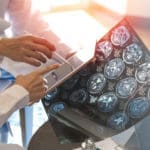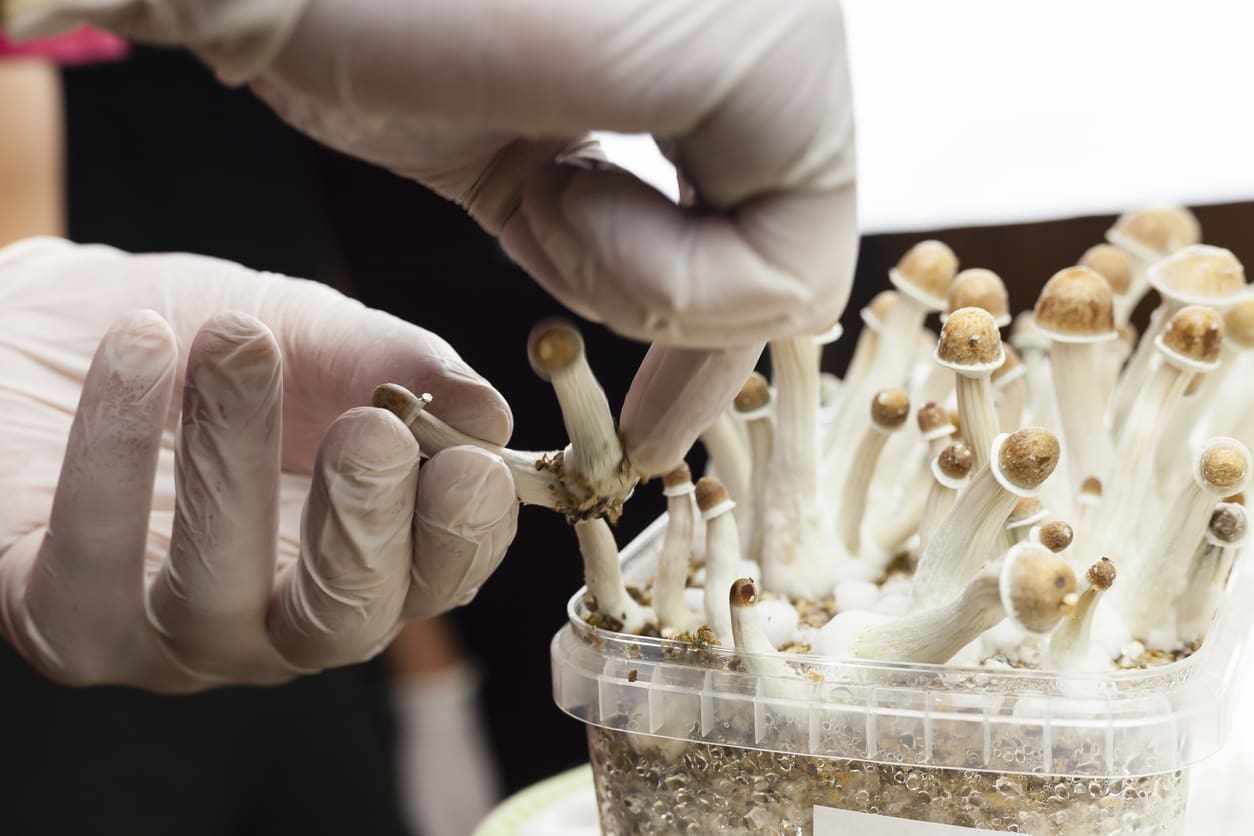While psychedelic agents like psilocybin have a history of recreational use, studies about how psilocybin helps depression are on the rise. Researchers are eager to understand how psychoactive mushrooms and other agents can be used in depression treatment both in place of and in addition to standard treatment methods. Psilocybin treatment has shown promising results in experimental trials, paving the way for patients and researchers to better understand how psilocybin helps depression.
What is Psilocybin?
Psilocybin is the primary psychedelic agent in Psilocybe, the psychoactive mushroom genus colloquially referred to as magic mushrooms. Ancient cultures in Mexico and the Southwestern U.S. have been using psychedelic mushrooms for over 3,000 years, generating a wealth of historical and cultural knowledge of their medicinal benefits.
In the scientific community, psilocybin was identified and synthesized in the late 1950s, with clinical trials beginning in the early 1960s. However, the increase in recreational use of psilocybin (along with lysergic acid diethylamide, or LSD) by countercultural figures in the 1960s provoked controversy. So when the Controlled Substances Act categorized psilocybin and other psychoactive agents as Schedule I drugs in 1970, psilocybin research halted. However, research into how psilocybin helps depression and other psychiatric disorders resumed in the late 1990s, and since then researchers have been heavily researching the therapeutic effects of psychedelics.
A naturally occurring alkaloid, psilocybin has a low potential for abuse and creates no physical dependence. This makes it an ideal candidate for understanding how psychedelics impact depression, and psilocybin has been gaining traction as a potential treatment for a variety of psychiatric disorders from obsessive-compulsive disorder to alcoholism. However, psilocybin administration is not usually a stand-alone treatment. Instead, psilocybin is usually administered in addition to psychotherapy, heightening its therapeutic potential. In this way, novel psychopharmacological therapies are paving the way for drug-assisted alternatives to traditional treatments, introducing new treatment methods for disorders that are difficult to treat with existing methods.
Researching How Psilocybin Helps Depression
While depression is most commonly treated with antidepressant medications, psychotherapy, or a combination of the two, standard treatment methods do not work for everyone. This is especially true for those with treatment-resistant depression (TRD). However, in a 2016 study during which 12 subjects with TRD were dosed with psilocybin (and given psychological support), patients noticed marked reductions in their depression symptoms for up to 3 months post-trial.
In 2017, researchers conducted a follow-up study to further assess how psilocybin helps depression, coming to very similar conclusions. Using 20 patients, the researchers administered two doses of psilocybin one week apart, and the subjects self-reported a decrease in depressive symptoms. The effects were neither delayed (as with antidepressants and talk therapy) nor short-lived (as with ketamine), suggesting that psilocybin is both a fast-acting and sustainable treatment for depression.
However, it is worth noting that these landmark trials are all small, with 20 participants maximum, and lacking a control group. For a drug or treatment to be approved by the Food and Drug Administration (FDA), it is usually tested on anywhere from 1,000 to 3,000 subjects before it is approved. To obtain more conclusive results, researchers must conduct studies with larger sample sizes.
Additionally, the negative interaction of psilocybin and antidepressants may constitute another barrier to widespread acceptance. The 2017 study on psilocybin and TRD shows that the use of antidepressants lessens the benefits of psilocybin while also putting patients at higher risk for serotonin syndrome. In the clinical trial stage and beyond, subjects will likely have to discontinue the use of antidepressants for efficacy and safety reasons. Additionally, researchers will need to determine when it is appropriate to restart the trial subjects on antidepressants post-psilocybin treatment to ascertain the best course of treatment.
Nonetheless, further experimental psilocybin trials with larger sample sizes are becoming feasible. In 2018, the FDA designated psilocybin as a breakthrough therapy for the treatment of TRD and post-traumatic stress disorder (PTSD), opening the door for further research on the therapeutic benefits of psilocybin. And in 2019, the FDA approved esketamine, a psychedelic agent, as a treatment for treatment-resistant depression. This has paved the way for new therapeutic approaches to psychedelic agents, supporting the further study of how psilocybin helps depression.
Psilocybin or TMS for Depression
While psilocybin is a promising treatment for depression, the stigma surrounding psychedelics and the lack of robust research studies so far can deter patients from trying it and physicians from recommending it. However, there are other options for depression treatment other than talk therapy and medication, the most proven and effective of which is TMS. Unlike psilocybin treatment, TMS has been FDA-approved for more than a decade, making it a safe and effective alternative to traditional treatment. Also unlike psilocybin, TMS can be safely administered in combination with antidepressants, helping it to fit seamlessly into your other mental health treatment modalities. If you want to learn more about Transcranial Magnetic Stimulation and its benefits, contact Mid City TMS today.



